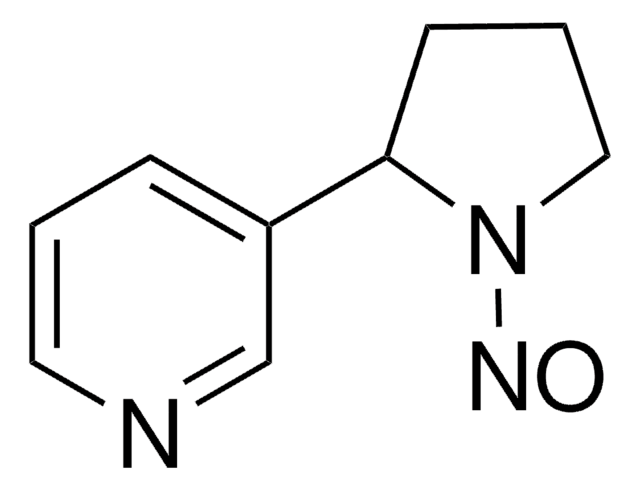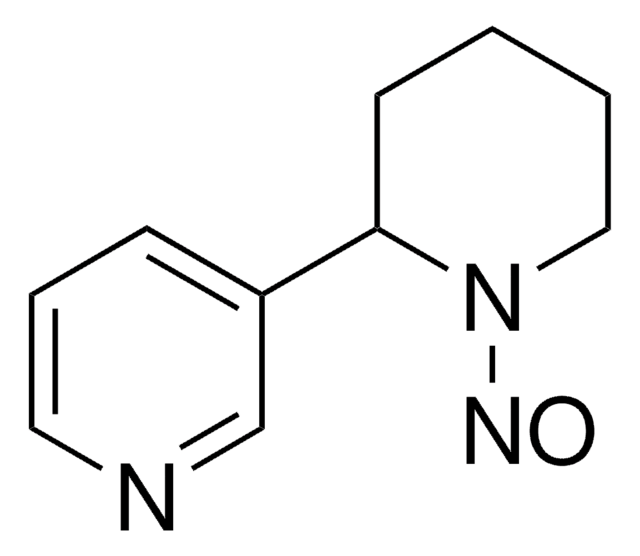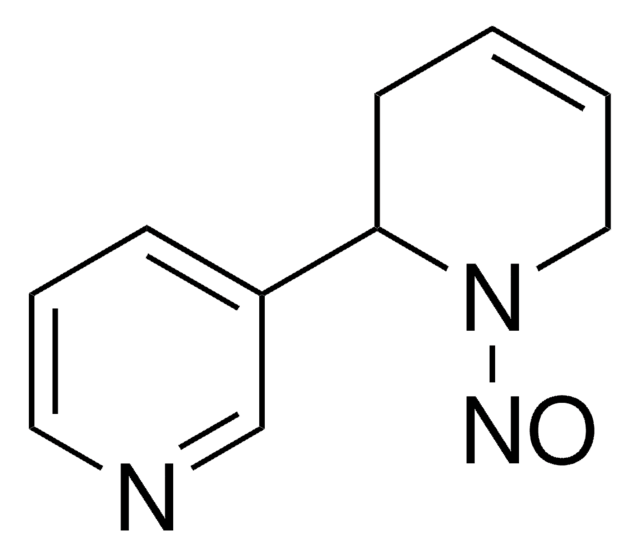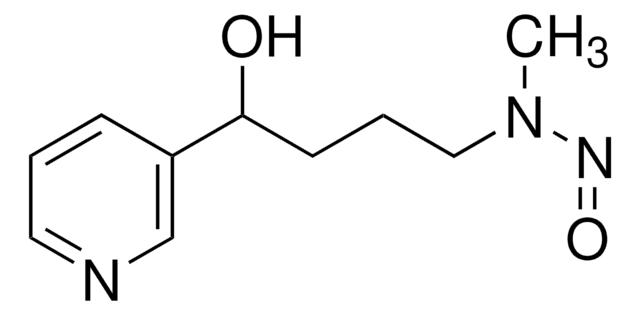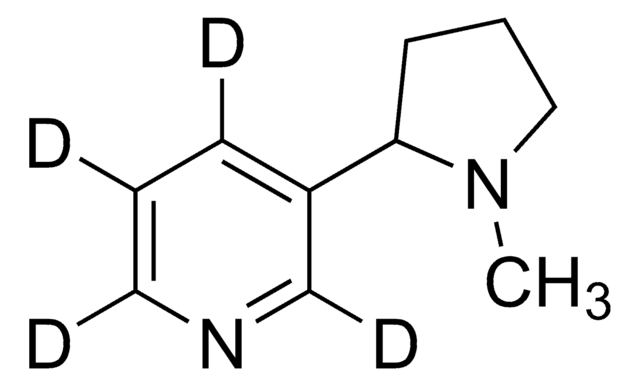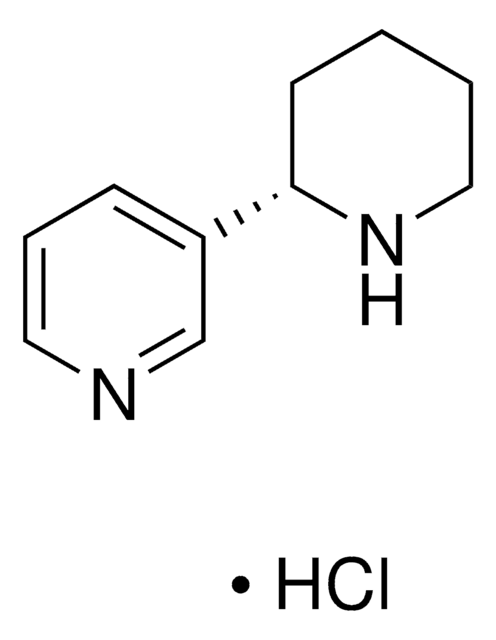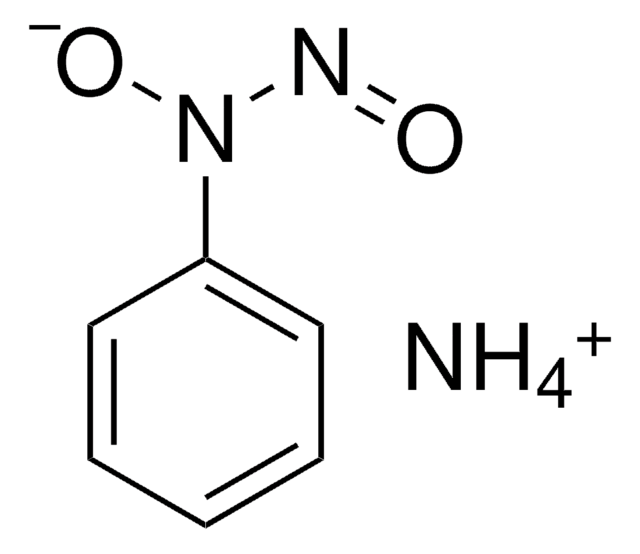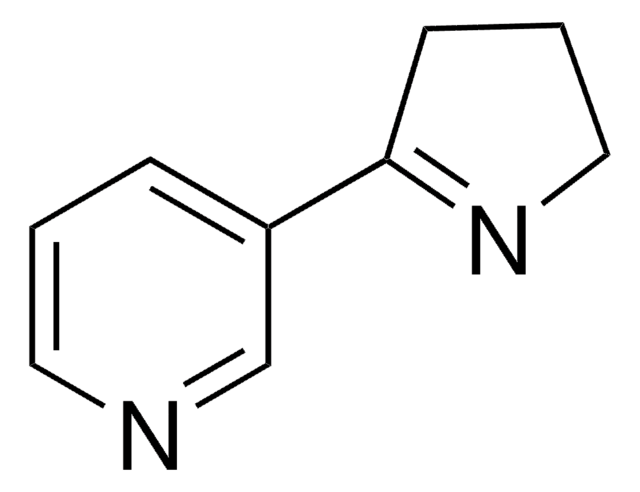N-075
(±)-N′-Nitrosonornicotine (NNN) solution
1.0 mg/mL in methanol, ampule of 1 mL, certified reference material, Cerilliant®
Synonym(s):
NNN, NNN solution
About This Item
Recommended Products
grade
certified reference material
form
liquid
feature
Snap-N-Spike®/Snap-N-Shoot®
packaging
ampule of 1 mL
manufacturer/tradename
Cerilliant®
concentration
1.0 mg/mL in methanol
technique(s)
gas chromatography (GC): suitable
liquid chromatography (LC): suitable
application(s)
forensics and toxicology
format
single component solution
storage temp.
−20°C
SMILES string
O=NN1CCCC1c2cccnc2
InChI
1S/C9H11N3O/c13-11-12-6-2-4-9(12)8-3-1-5-10-7-8/h1,3,5,7,9H,2,4,6H2
InChI key
XKABJYQDMJTNGQ-UHFFFAOYSA-N
General description
Application
- Validated Stability Indicating Chromatographic Methods for Quantification of Imidocarb Dipropionate; Application for the Determination of Its Residues in Bovine Meat and Milk Samples.: This study developed and validated chromatographic methods using silica gel 60 F₂₅₄ TLC plates to quantify imidocarb dipropionate residues in bovine meat and milk, highlighting the technique′s stability and reliability in complex matrices (Sedik et al., 2020).
- Development and Validation of Chromatographic Methods for Simultaneous Determination of Paracetamol, Orphenadrine Citrate and Caffeine in Presence of P-aminophenol; Quantification of P-aminophenol Nephrotoxic Impurity Using LC-MS/MS.: This research outlines the development and validation of chromatographic methods on silica gel 60 F₂₅₄ TLC plates for analyzing paracetamol, orphenadrine citrate, and caffeine alongside their nephrotoxic impurities, demonstrating the plate′s effectiveness in simultaneous multi-analyte detection (Boltia et al., 2020).
- Simultaneous Quantification of Chlorpheniramine, Phenylephrine, Guaifenesin in Presence of Preservatives with Detection of Related Substance Guaiacol in their Cough Syrup by RP-HPLC and TLC-Densitometric Methods.: This study developed RP-HPLC and TLC-densitometric methods using silica gel 60 F₂₅₄ TLC plates for the quantification of active ingredients and preservatives in cough syrup, showcasing the plate′s utility in pharmaceutical quality control (Boltia et al., 2019).
- Quantitative Determination of Synthesized Genotoxic Impurities in Nifuroxazide Capsules by Validated Chromatographic Methods.: This work validated chromatographic methods using silica gel 60 F₂₅₄ TLC plates for quantifying genotoxic impurities in nifuroxazide capsules, emphasizing the plate′s precision in detecting trace contaminants (Abdelwahab et al., 2018).
- High-performance Thin-layer Chromatography Method Development, Validation, and Simultaneous Quantification of Four Compounds Identified in Standardized Extracts of Orthosiphon stamineus.: This research presents a validated HPTLC method on silica gel 60 F₂₅₄ TLC plates for simultaneous quantification of compounds in herbal extracts, highlighting the plate′s role in natural product analysis (Hashim et al., 2016).
Legal Information
related product
Signal Word
Danger
Hazard Statements
Precautionary Statements
Hazard Classifications
Acute Tox. 3 Dermal - Acute Tox. 3 Inhalation - Acute Tox. 3 Oral - Flam. Liq. 2 - STOT SE 1
Target Organs
Eyes
Storage Class Code
3 - Flammable liquids
WGK
WGK 2
Flash Point(F)
51.8 °F - closed cup
Flash Point(C)
11.0 °C - closed cup
Certificates of Analysis (COA)
Search for Certificates of Analysis (COA) by entering the products Lot/Batch Number. Lot and Batch Numbers can be found on a product’s label following the words ‘Lot’ or ‘Batch’.
Already Own This Product?
Find documentation for the products that you have recently purchased in the Document Library.
Customers Also Viewed
Our team of scientists has experience in all areas of research including Life Science, Material Science, Chemical Synthesis, Chromatography, Analytical and many others.
Contact Technical Service